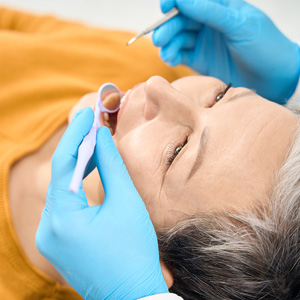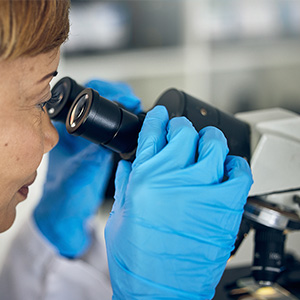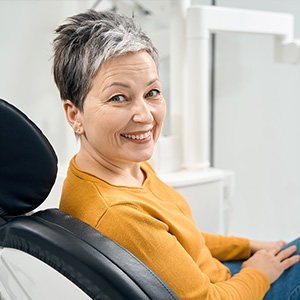Oral Diagnosis & Biopsies
Our dentists have the training and tools to diagnose oral disease and help you get the treatment you need.



Another reason to keep up with routine dental care
Did you know that dentists are often the first to identify signs of oral and systemic diseases? That’s right, dental exams aren’t just for finding cavities. The dentist also visually examines the soft tissues of the mouth and palpates your head, jaw, and neck.
If your dentist does find a concern like a suspicious mass or lesion, they can perform a biopsy to help you get an accurate diagnosis. For things like oral cancer, early detection is crucial, so if you have a concern, book an exam right away.
Early detection significantly improves the chances that treatment will be successful, particularly when it comes to oral cancer.
Once they make a diagnosis, your dentist will create a personalized treatment plan. They’ll be by your side throughout the entire process.
If a sore or bump is benign, knowing that will give you peace of mind. The dentist will also provide homecare instructions to help with discomfort.
What to expect if you have an oral pathology

Your dentist will examine the suspicious area and chat with you about any symptoms and changes you’ve noticed. They may also perform or order additional diagnostic imaging.

Most lesions are benign but it’s always better to be safe, so depending on the findings from the exam, the dentist may recommend a biopsy. They’ll numb the area with local anesthesia before removing part of the mass or lesion.

Your tissue sample will be sent to the lab, and a pathologist will examine it under a microscope. We’ll call you with the results as soon as we get the pathology report, which usually only takes a few days.

Your dentist will give you homecare instructions to help with healing and manage discomfort. If further treatment is needed, they’ll work with you to determine next steps and provide referrals.
What do you screen for during an exam?
Our dentists screen for a wide range of conditions, such as:
- Oral cancer – a type of head and neck cancer
- Leukoplakia – white patches inside of the mouth that are usually benign but can be precancerous
- Fibroma – a benign lump inside of the mouth
- Lichen planus – chronic red or white, lacy patches that can cause pain and burning
- Pregnancy tumors – benign swelling of the gum tissue
What are the signs I should watch out for?
Most conditions are benign but it’s still important to see a dentist for an evaluation if you have:
- Red or white patches inside of your mouth
- Hoarseness or a sore throat that doesn’t go away
- Ulcers or sores that don’t heal or bleed easily
- Chronic swelling of the soft tissues in your mouth
- Difficulty chewing or swallowing
- Bumps or lumps in the mouth or on the neck or jaw

